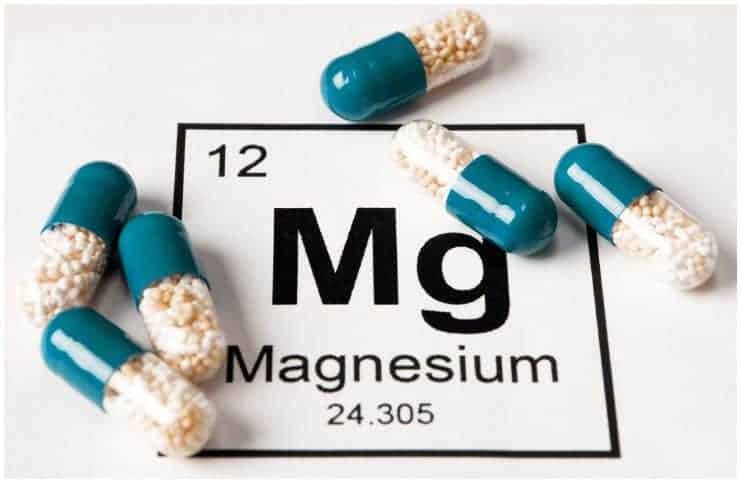Magnesium Oxide vs Magnesium Citrate – Which Is The Best Supplement?
Magnesium (Mg) is a mineral important for a variety of systems in the human body, but it is particularly vital for healthy bones and muscles.
Another Mg important role is acting as a cofactor in the biochemical reactions (more than 300) continuously performed by enzymes.
Furthermore, this mineral is required for the synthesis of RNA, DNA, and the antioxidant glutathione, as well as GABA function, an inhibitory neurotransmitter that produces serotonin.
Also, according to recent research, getting adequate Mg during pregnancy can help prevent the uterus from contracting prematurely.
The human body contains approximately 25 g of Mg, 50 to 60% of which is stored in the skeletal system. The rest of Mg is present in soft tissues, muscles, and bodily fluids.
The standard American diet (characterized by higher intakes of high-fat dairy products, red and processed meat, eggs, butter, refried beans, refined grains, and high-sugar drinks) does not provide adequate Mg levels to meet the recommended daily amount of about 420 mg for men over 30 and 320 mg for women older than 30.
A deficiency in this essential mineral is strongly associated with high blood pressure, osteoporosis, calcification of the arteries, heart disease, clogged arteries, muscle spasms and cramps, stroke, and type 2 diabetes mellitus.
Magnesium Oxide (MgO)
It is a white hygroscopic solid mineral that occurs naturally as periclase, typically found as a component of metamorphosed dolomitic limestones.
One of the reasons behind its current popularity among Mg supplements is its low manufacturing cost.
Uses
Some studies concluded that low levels of Mg may be linked to anxiety, and some individuals take MgO to relieve signs and symptoms of anxiety.
Moreover, MgO may be used as a rapid emptying of the bowel, especially before surgery as well as an antacid to relieve sour stomach, heartburn, or acid indigestion.
Additionally, according to a 2009 study, blood Mg levels are frequently low in sufferers with vascular headaches; therefore, it is recommended to use MgO to reduce the signs and symptoms of a migraine.
Interestingly, MgO nanoparticles may act as a bactericide effective against E. coli and Salmonella, as per a 2011 study issued in the Journal of Nanoparticle Research.
READ MORE: Butenafine Hydrochloride vs Clotrimazole
Magnesium Citrate
It is basically a combination of citric acid and Mg. It is available both as a brand name (like – Citroma and Citromag) and generic, without a prescription.
This supplement is typically used to treat occasional constipation since it retains water in the intestines by osmosis. Moreover, increasing water in the bowel boosts motility, generally producing a bowel movement within 30 minutes to 6 hours.
Also, using this supplement orally is more effective at cleaning the large intestine compared to castor oil to help facilitate a better colonoscopy (a medical procedure in which a specialist uses a colonoscopy to look inside the colon and rectum), according to a study issued in the Journal of Gastroenterology and Hepatology.
READ MORE: Magnesium Glycinate: Side Effects
Side Effects And Precautions
While generally safe, like any type of supplements, these also carry a risk of side effects, including:
- imbalance in the levels of potassium, sodium, chloride, calcium, and phosphate in the blood;
- high levels of Mg in the bloodstream (hypermagnesemia) with symptoms including – confusion, muscle weakness, impaired breathing, and decreased reflexes;
- intestinal and stomach problems such as – diarrhea, gas, vomiting, nausea, and stomach cramping.
Serious side effects (very rare) may include:
- vomiting;
- nausea;
- muscle weakness;
- irregular heartbeat;
- fast heartbeat;
- chest pain;
- hoarseness;
- trouble talking;
- tightness in the throat;
- wheezing;
- fever;
- breathing problems;
- allergic reactions like skin itching or hives, rash, swelling of the lips, face, or tongue.
Do not use this type of supplement without talking to your healthcare provider first if you have impaired kidney function since it can interfere considerably with the body’s ability to remove excess Mg.
Drinking alcoholic beverages after taking Mg supplements is not advised since alcohol intake can damage the intestinal and stomach lining, which actually prevents the absorption of this mineral (and other essential nutrients) into the bloodstream.
If you are pregnant or breastfeeding a baby, only take Mg supplements under your healthcare provider’s supervision.
READ MORE: Midol vs Pamprin – Which Is Better For Menstrual Cramps Relief?
Magnesium Oxide vs Magnesium Citrate – Which Is The Best Supplement?
Regarding the actual difference between these two supplements, it all comes down to what molecule magnesium is bonded to.
Therefore, according to data, MgO has poor bioavailability, but Magnesium citrate is the best-absorbed type of magnesium when taken orally. The problem is that it is a potent laxative.
READ MORE: Potassium Gluconate vs Potassium Citrate
Food Sources
The best sources of magnesium are fruits and vegetables, including – flaxseeds, pumpkin seeds, Brazil nuts, oat bran, sesame seeds, almonds, cashews, walnuts, peanuts, pecans, sunflower seeds, pistachios, spinach, Swiss chard, black beans, prunes, figs, apricots, dates, chickpeas, red kidney beans, lentils, kale, zucchini, avocados, bananas, turnip greens, and broccoli.
Note
A high-fat diet causes the human body to absorb smaller amounts of Mg than normal.
Cooking decreases the Mg content of foods. More importantly, high rates of antibiotics and prescription medicines damage the digestive tract, which also leads to malabsorption of Mg.
Featured image credit – Shutterstock




I take 250 mg Daily for sleep/anxiety. I switched from oxide tablets to citrate capsules. I’m 89, have COPD and CHF. Is the citrate harmful?